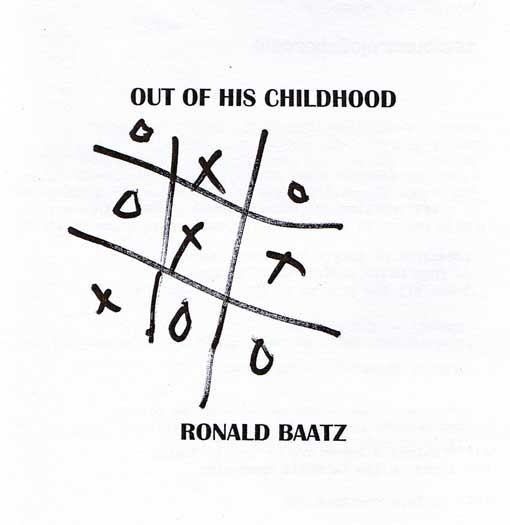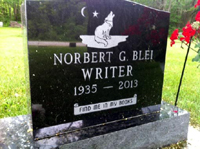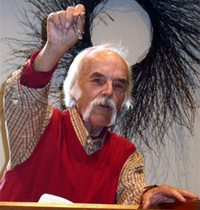


Poetry Dispatch No.179 | August 4, 2007
1 + 1 | Mark Weber & Ronald Baatz
This is a chapbook featuring two separate books in one, which you don’t realize till you flip the cover and discover a different title, different cover, different writer.
Mark Weber, whom I do not know and have not read before, hosts a jazz program on KUNM 89.9 FM in Albuquerque, New Mexico, writes a good, honest poem not without music of his own and considerable wisdom. The writing world can use more Mark Webers – even though he claims in one poem, “The Heat: “there are too many gawd damn’d Mark Webers in the world.”
ZERXPRESS, 725 Van Buren Place SE, Albuquerque NM 87108 and zerxpress.blogspot.com will no doubt put you in touch with him. 400 copies of this chapbook (#59) were printed in June, 2007 No cover price. Whatever he’s asking, it’s worth it.
Sharing the same staple binding (flipping it over) I discover a writer I do know and much admire: Ronald Baatz. There are 16 poems in “his book” called OUT OF CHILDHOOD (in this book)…all of them winners. Baatz always writes a beautiful poem.
I remain a firm believer and true lover of the unpretentious, common chapbook such as this, held together by two staples and a simple cover. Though most writers seek (demand) a more professional “perfect-bound” production of their work, there is a long, literary history to the common chapbook. Almost every writer of note has found comfort and small fame in the pages of a chap. Some outgrow the format in time. While others remain at home there forever. Norbert Blei

I was telling Bradford that
I prefer my jazz musicians to be
a little beat up, have an eyeball gouged out
a few scars, a couple divorces, to know
what it’s like to stand on a freeway berm
with a broken-down jalopy in the middle
of the night, to have had some life
happen to them —
I’m not interested in listening to
what they have to say otherwise —
I know it’s a prejudice, but I can’t
help my prejudices, they exist outside
my control, maybe that’s why
black men make some of the most interesting
jazz music? to be a black man in America
is an extreme outsider position to find oneself—
you know, why do I
care what a milktoast chubby mama’s boy
in a cardigan has to say? there’s nothing
about that, black or white, that
interests me —
which begs the question: are not the
vicissitudes that visit upon every life
of some meaning? even if
they’ve never stood in a welfare line before?
certainly, everybody has a soul
and each individual is important
but
this poem is about prejudice
mine, in particular
Mark Weber from POEMS & DOODLES

I can see it up ahead, not
far distant. A kingdom, and
something written upon the gate.
A person who spends their entire
life scribbling poems is
known as a poet. Poets are
vastly over-rated. They are good,
honest, slightly
naive people who write these poems,
forever holding the candle
of idealism. But, mostly, say
98% of those who (proudly) call
themselves Poets, are, in reality, idiots.
And they run all over town
putting up posters for
their next public readings.
They have things
they want to rant about, certain
things, maybe
they’re indignant somebody pissed
on the flowers?
Even though, I have written 10,143 poems,
and am in fact writing one right now, I do
not allow myself to be called a poet, capital P
or otherwise. It is
too embarrassing. One can’t help
but
wonder if one is also an idiot? or
am I a member of the 2% who
bring some dignity to the craft?
(Even if it was me
who pissed on the .flowers.)
(Hard to see in the dark.)
Nevertheless, up
ahead
is that kingdom and as the years
clear away the fog
it is for me to
walk through that gate marked:
Fool.
Mark Weber from POEMS & DOODLES

Mark Weber | Photo by Janet Simon on the Acoma-Zuni Trail 28may07 – The Malpais

READING MARQUEZ by Ronald Baatz
I find it is a good time in my life to be reading
the autobiography of Gabriel Garcia Marquez.
When Marquez was a child he was able to gain
and hold the attention of adults by telling stories
in which he had greatly magnified details.
As an adult he carried this tendency into the writing
of his books, even when it came time to tell the story
of his life. I find the many magical occurrences,
that take place in this telling, make it much easier
for me to accept what my father is going through: the
unbelievable distortion of his memories, hallucinations
that plague him night and day. Unfortunately,
Marquez is of no help to my mother whatsoever.
Right now it seems as though his disease will be
the death of her before it is the death of him.
The amount of patience and understanding required
other is almost too much to ask of one person.
Besides, she tells me, it is all so incredibly boring. Yesterday
when she left him at home for a short period of time,
in order to run into town, she found herself
sitting in the bank crying to the teller. This crying
in public for her is becoming more and more frequent.
When I call her at night I am almost afraid to hear
what the news of the day is. It’s questionable
whether we will have a birthday party for him in June.
Would he recognize anyone who has come to
wish him a happy birthday? Would everyone
appear to him as being a frightening stranger?
Would the gathering throw him into further sorrow?
He has always said that he wanted to live to be
a hundred, and now it does look as though he’ll
do exactly that, if only because he thinks in June
he will be a hundred. And if he recognizes no one
at the party, then I’m sure it will indeed feel to him
as though he has lived “a hundred years of solitude.”
from OUT OF HIS CHILDHOOD

APRIL BEGINS by Ronald Baatz
I took my mother to the lawyer’s office
to see about having some papers signed.
It’s been decided I should be given “Power of Attorney”
and the right to determine what will happen to my father
when it’s a matter of keeping him alive by medications
or other artificial means. Before approaching my father
my mother and I thought it best to talk a few things over
with the lawyer, without my father being present.
The lawyer turned out to be rather a decent guy.
So did one of his secretaries, the older one.
The younger one seemed obsessed with making sure
that she was able to have her breakfast at her desk,
undisturbed. We were there maybe half an hour,
charged a hundred dollars which I thought cheap.
Afterwards I suggested my mother and I have coffee, but
my mother said she had to get back to my father since
my father was being watched by a neighbor.
So, crossing a busy street, I walked her to her car.
She took my hand. It felt so diminished and bony, and
never had I felt a woman’s hand hold my hand so firmly.
I felt like weeping right there in the street, stopping traffic
and just weeping, but of course that didn’t happen.
She got into her car, made a u-turn and drove off.
I stood there, rooted in front of a closed movie theater
in a decaying town in Upstate New York, on a morning
April had begun. I was well aware that
the horrors of Alzheimer’s required many of its victims
to enter a nursing home. I dreaded the day when, after
their sixty years of marriage, I’d have to separate them.
It’ll be like tearing the wings off a homing pigeon and
throwing the parts up into the air and expecting them to fly.
from OUT OF HIS CHILDHOOD




























































Leave a comment